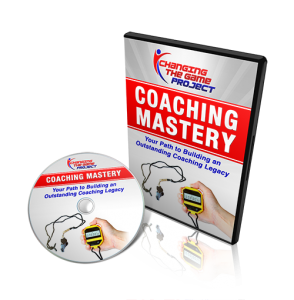By John O’Sullivan, founder of Change the Game Project
Is your child a great practice player, but one who struggles to perform in games? Does she score at will in easy games, but cannot the competitive ones? Does your team play great in meaningless games, but tense up and play poorly when the result matters? Does your team always play great until they build a lead, and then sit back and let the other team back into the game? If any of these sound familiar, then you are likely dealing with athletes who at times play to win, and at other times play not to lose. The effect upon performance of these two mindsets can be a massive one.
The excellent new book Top Dog: The Science of Winning and Losing by Ashley Merryman and Po Bronson delves into fascinating research on the mindset of performance. Recent research in neuroscience and psychology tells us that athletes who view specific scenarios as a threat perform vastly different then athletes who view a similar scenario as a challenge. Take for example penalty kick shootouts in professional soccer, which are used to determine a winner in knockout competitions such as the World Cup. Researches Gier Jordet and Esther Hartman studied the conversion rate of penalty takers who were kicking the final shot of a penalty shootout. They compared the following scenarios:
- The shooter’s team was down by a goal and he had to make the kick to tie; if he missed, the team would lose
- The shooter’s team was tied, and he did not have to make the shot, but if he did, the team would win the game
Jordet and Hartman found that in the first scenario, when missing the kick would cause the team to lose, professional players only converted 62% of those shots. However, when conversion would result in a win, kickers were successful 92% of the time! Same kick, same distance, same target, but a 30% improvement when the player was shooting to win, and not shooting NOT to lose.
Other studies have found similar results in basketball, where players will consistently shoot above their career free throw percentage when the game is tied, but below it when they are a point up or a point down. The point is that when athletes are challenged to rise to the occasion, they perform better then when they are threatened to not blow it. Challenged athletes tend to focus on the prize for success, while threatened athletes focus on the consequences of failure. Neuroscience tells us that these two different reactions to the same situation cause vastly different responses in our brains, and thus the results we see above.
As parents and coaches, in order to combat this the secret then is to change the situation for our athletes from a threatening one to a challenging one. Researchers Adam Altar and Joshua Aronson administered a test to Princeton undergrads, whereby they present half the group with a test of their ability – a threat – and half of them with a “Intellectual Challenge Questionnaire” where nobody was expected to solve all the problems. The result: threatened students got 72% correct, and challenged undergrads scored an average of 90% correct!
Next time your athletes take the field, ask yourself “Have I framed today’s competition as a challenge to be aspired to, or a threatening test where the consequences of failure are grave.” As coaches and parents, we have to asses every specific situation and frame it appropriately as a challenge. When we do, my guess is that your athletes will perform much better!
If you would like, please share with me any situations where you have successfully challenged your athletes versus threatened them, and how they have played as a result.
(For more, please see Po Bronson and Ashley Merryman’s fantastic new book Top Dog: The Science of Winning and Losing.The examples cited here can be found in the chapter on “The Difference Between Winning and Not Losing” p 136-138. This book has been a huge eye opener for me, and I will be writing a lot more about the material I have found within it in the future.)
Changing the Game Project is a site that is your one stop shopping for the latest and greatest information, research, and best practices regarding high performance, motivation, Long Term Athletic Development, fitness, nutrition, college recruiting, and more.
 Coach Sullivan is offering a FREE video series which is part of his Coaching Mastery program which includes motivational and team building techniques used by some of the top coaches in the world. To gain access to his free video series click the link below or the image at the left.
Coach Sullivan is offering a FREE video series which is part of his Coaching Mastery program which includes motivational and team building techniques used by some of the top coaches in the world. To gain access to his free video series click the link below or the image at the left.